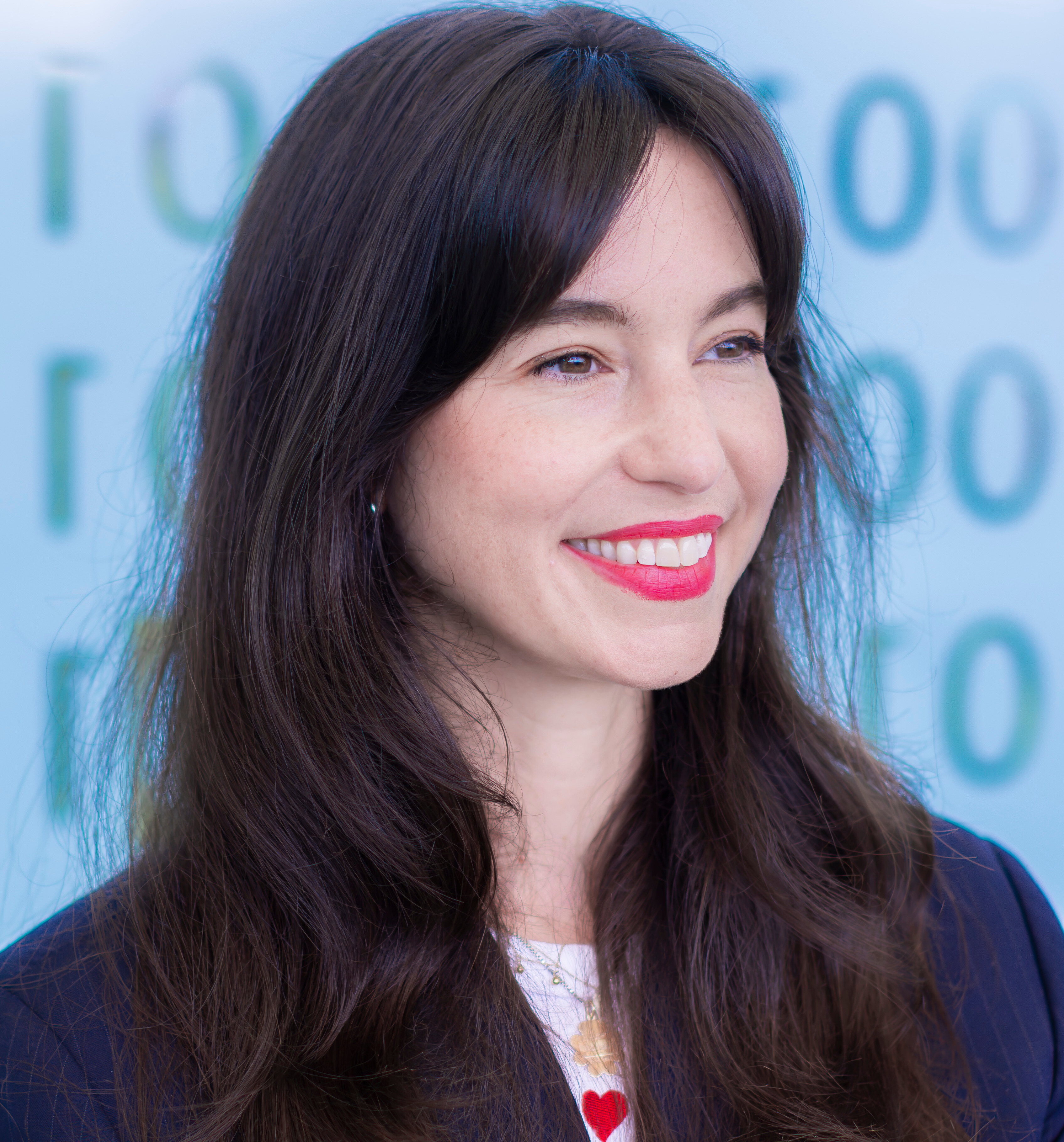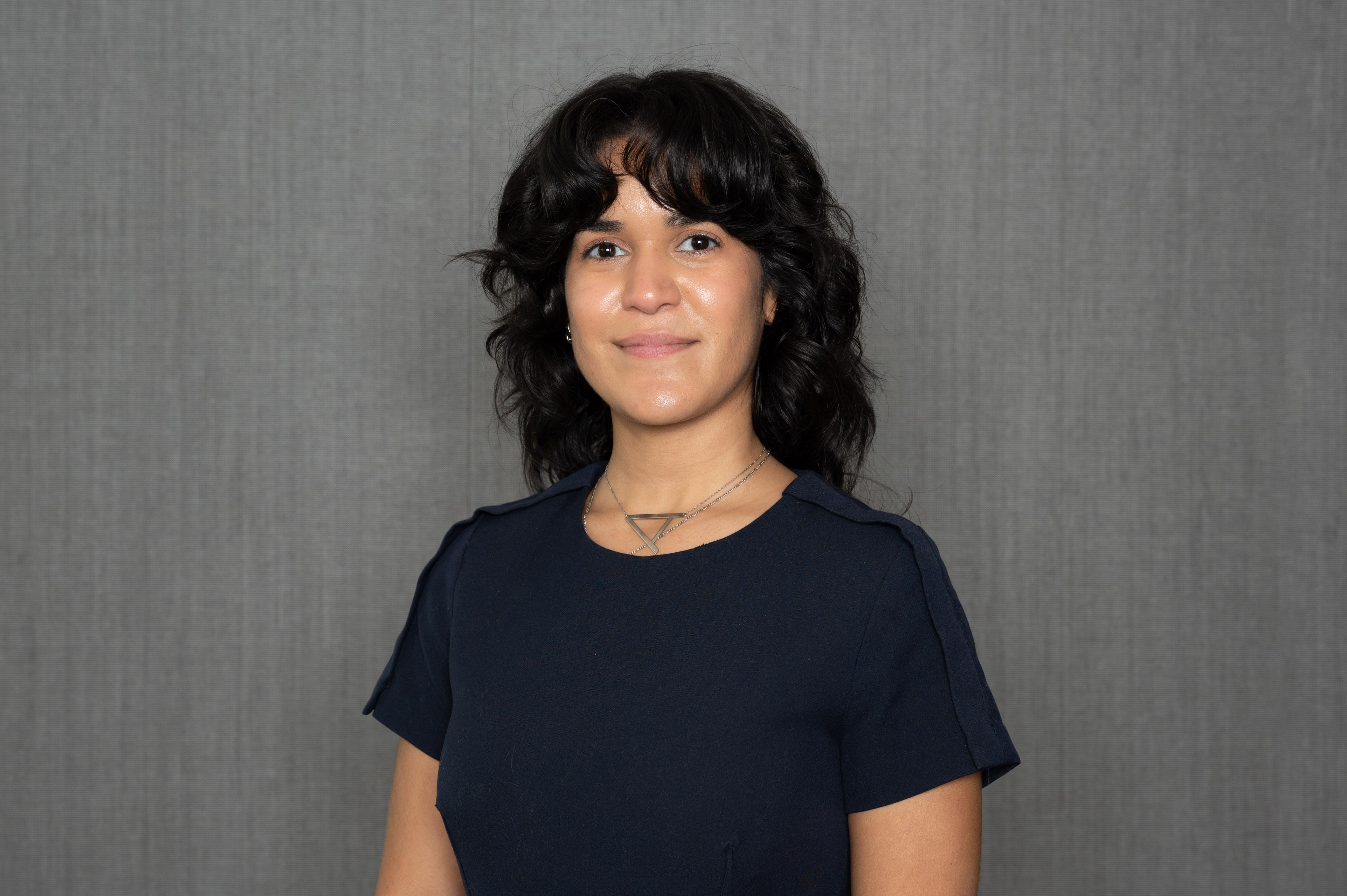Transport | Transform | Transcend
Innovations in Materials and Movements
Curated by Birney Robert
Assistant Curator, Adriana Rosario Perez
This exhibition showcases the groundbreaking work of artists and researchers at Georgia Tech who merge science, technology, and design to reimagine traditional notions of movement, materiality, and meaning. From AI-powered dance and robotic percussion to parametric textiles and plastic wastes, each piece explores movement in a physical, digital, and cultural way as a catalyst for transformation. Featuring eight creative projects, Transport | Transform | Transcend invites travelers to reflect on innovation not just as a journey of emergence, but as a pathway to empathy, sustainability, and creative collaboration. Investigating the limitations and potential of technology, these works challenge us to see technology not only as a tool, but as a partner in shaping more inclusive and imaginative futures.
Whether it is dancing, bicycling, making music, designing, engineering, or thinking about the transportation of data and humans, Georgia Tech is creating new innovations that help question and power the future of technology and creativity. Artists and Researchers who make up this exhibit are Georgia Tech researchers, Brian Magerko, Milka Trajkova, Henrik von Coler, Gil Weinberg, Lisa Marks, Hyojin Kwon, Ashutosh Dhekne, Daniel Phelps, and Juan-Pablo Correa-Baena, and Georgia State University researcher, Jeremy Bolen.
Birney Robert is a strategist at Georgia Tech Arts, where she leads initiatives that unite art, science, and technology to inspire collaboration and public engagement. Her curatorial and programmatic work bridges creative practice with research innovation, highlighting the role of the arts in shaping conversations about technology and society. Robert’s portfolio includes exhibitions funded by Microsoft, curatorial projects for AMP’s Atlanta Art Fair, and large-scale installations at Hartsfield-Jackson Atlanta International Airport that bring experimental and community-based works to diverse audiences.
With a background in museum anthropology and studio art, she has developed a distinctive approach to cultural strategy—one that values accessibility, sustainability, and the human experience within digital culture. Known for building cross-sector partnerships between artists, engineers, and researchers, Robert continues to advance initiatives that explore digital identity, environmental responsibility, and the evolving relationship between creativity and technology in the twenty-first century.
Milka Trajkova and Brian Magerko

Milka Trajkova is a research scientist in Georgia Tech’s Expressive Machinery Lab and a former professional ballet dancer. Trajkova’s work on May AI Have This Dance? draws on her background in ballet and human-centered AI, using embodied interaction to investigate how non-invasive technologies can support creativity, learning, and expressive movement.Her research bridges movement, technology, and design, developing non-invasive, AI-based tools that enhance human motion and creative expression. By combining artistic intuition with computational insight, Trajkova explores how interactive systems can support learning, rehabilitation, and the future of embodied creativity. She earned her Ph.D. in Informatics with a specialization in Human-Computer Interaction from Indiana University.
Explore More about LuminAI
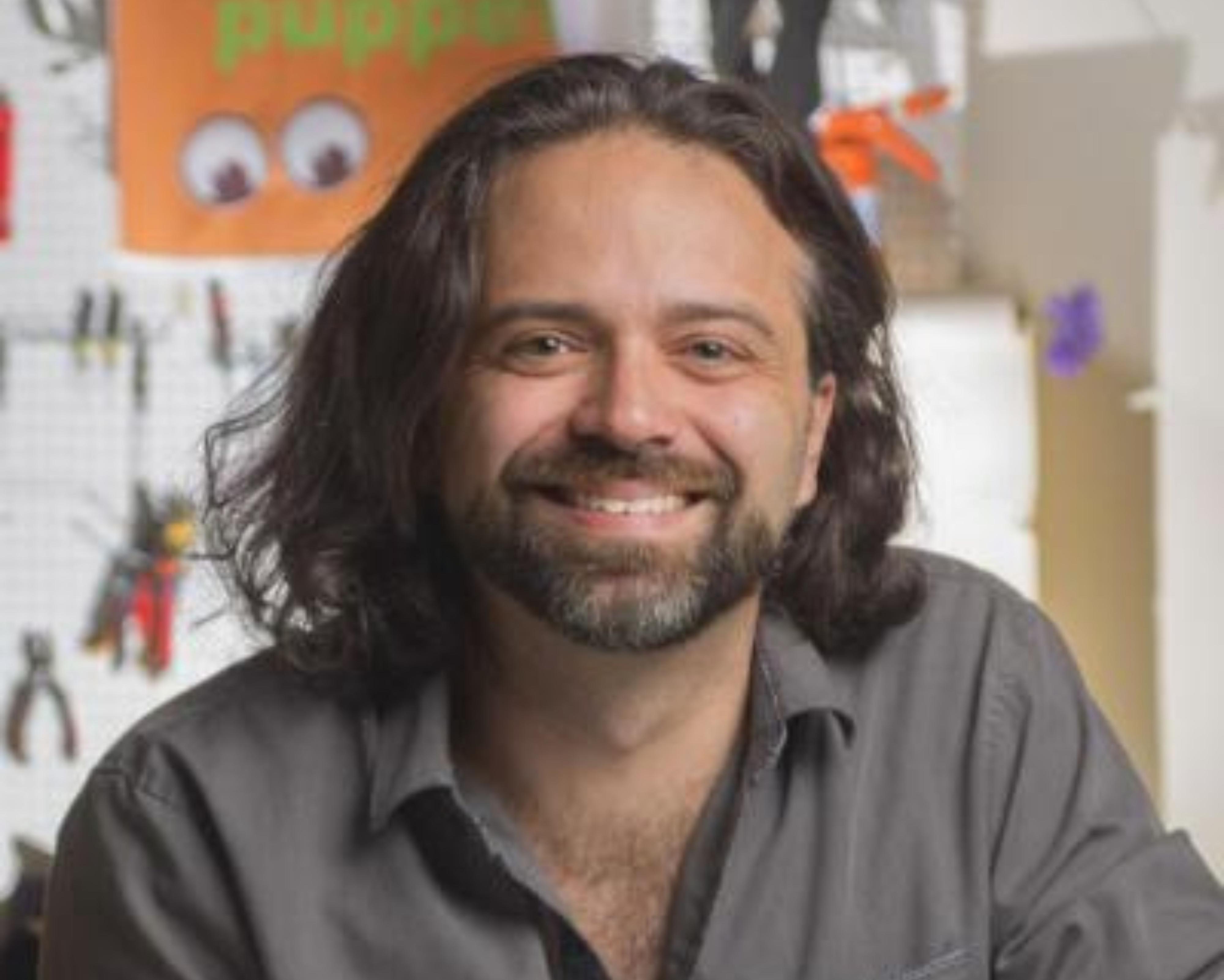
Brian Magerko is a professor of digital media, director of graduate studies in digital media, and head of the Expressive Machinery Lab at Georgia Tech. In May AI Have This Dance? Magerko explores how human and machine cognition can shape new creative experiences, using improvisational movement and artificial intelligence to examine what it means to co-create with a digital partner. His research combines cognitive science, computer science, and computational media to study how humans and machines create together. Magerko has led more than $15 million in federally funded research, authored over 100 peer-reviewed publications, and co-founded the award-winning music-based coding platform EarSketch, used by more than 160,000 learners worldwide. Click Here to Learn More.
Explore More About LuminAI
May AI Have This Dance?
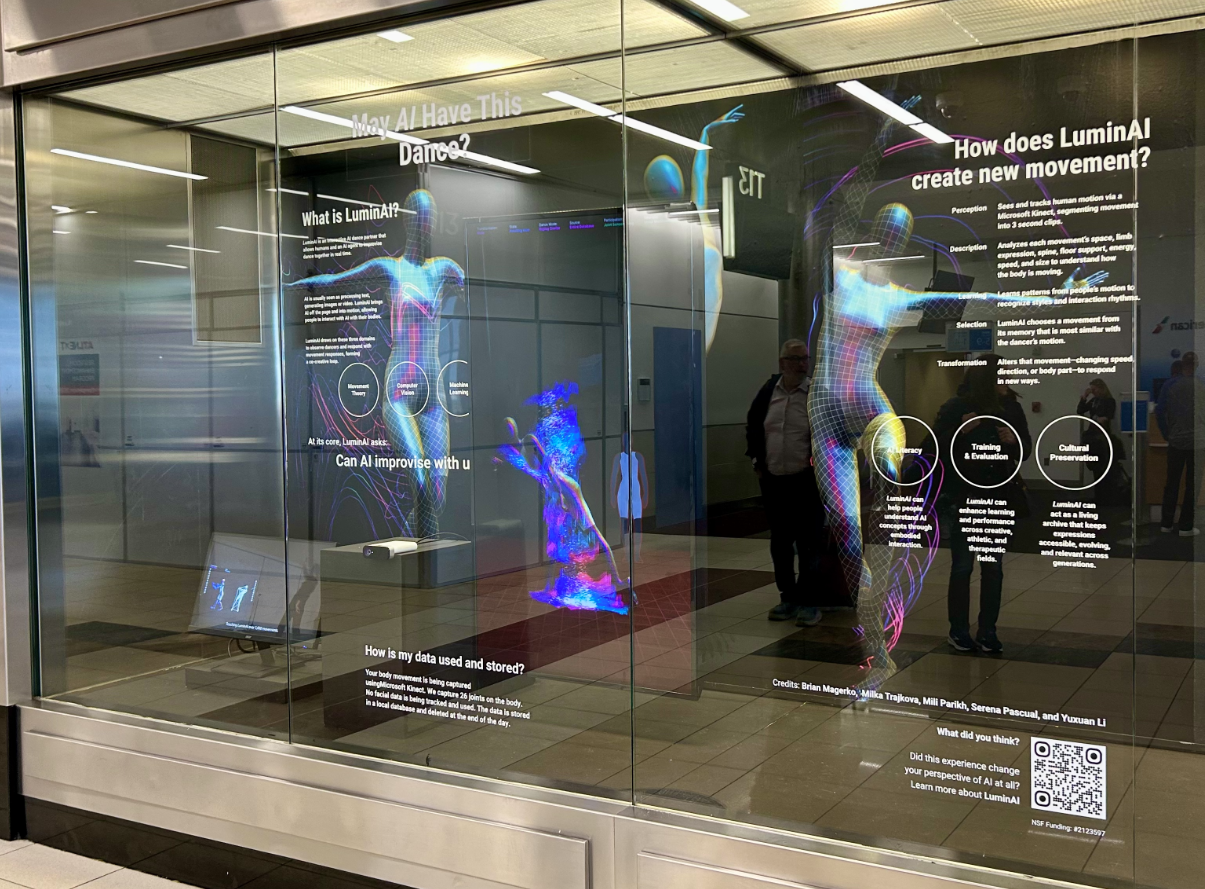
At its core, May AI Have this Dance? examines how humans and intelligent systems co-construct meaning and creativity through embodied interaction. LuminAI uses AI to transform human movement into new movement. This fosters a co-creative exchange between human and machine It functions as both performance and research artifact—a living platform for studying co-creativity, AI literacy, and the emotional dimensions of human-machine collaboration. By inviting audiences to move, observe, and respond, LuminAI transforms spectators into co-performers, blurring the boundary between art and research. In doing so, it offers a glimpse into more relational, expressive, and human-centered forms of artificial intelligence that emphasize empathy, collaboration, and shared imagination.
Developed by researchers in Georgia Tech’s Expressive Machinery Lab in collaboration with the Kennesaw State University Department of Dance and KSU's Andrea Knowlton, LuminAI is grounded in close partnership with dance faculty and dancers whose embodied knowledge shapes how the system learns, responds, and improvises. This work was supported in part by the U.S. National Science Foundation under Award #2123597.
Henrik von Coler & Ryan Hersh

Henrik von Coler is a composer, researcher, and educator whose work explores sound, sustainability, and mobility through electronic instruments and performance systems. Henrik von Coler created the musical architecture of BIKES, designing a mobile, networked instrument that turns electric bicycles into a platform for electronic sound and public performances. Through his work, he examines the evolving relationship between sound, place, and sustainable production in the digital age, promoting a vision of music-making that is both innovative and ecologically conscious. His practice bridges music technology, design, and environmental awareness, investigating how portable and modular instruments can shape new ways of listening, performing, and creating. Click Here to Learn More.
Explore More About BIKES.

Ryan Hersh is the founder of Edison Electric Bikes, an Atlanta-based company dedicated to redefining urban mobility through high-performance electric bicycles. Combining engineering precision with handcrafted design, Hersh creates e-bikes that blend efficiency, sustainability, and style while supporting cleaner, smarter modes of transportation. Under his leadership, Edison has become a catalyst for the city’s growing cycling culture, partnering with artists, designers, and institutions to explore new intersections between technology and mobility. Through his work, Hersh advocates for accessible, eco-conscious transit that reshapes the rhythm of modern cities and inspires a more sustainable urban future. Click Here to Learn More.
BIKES
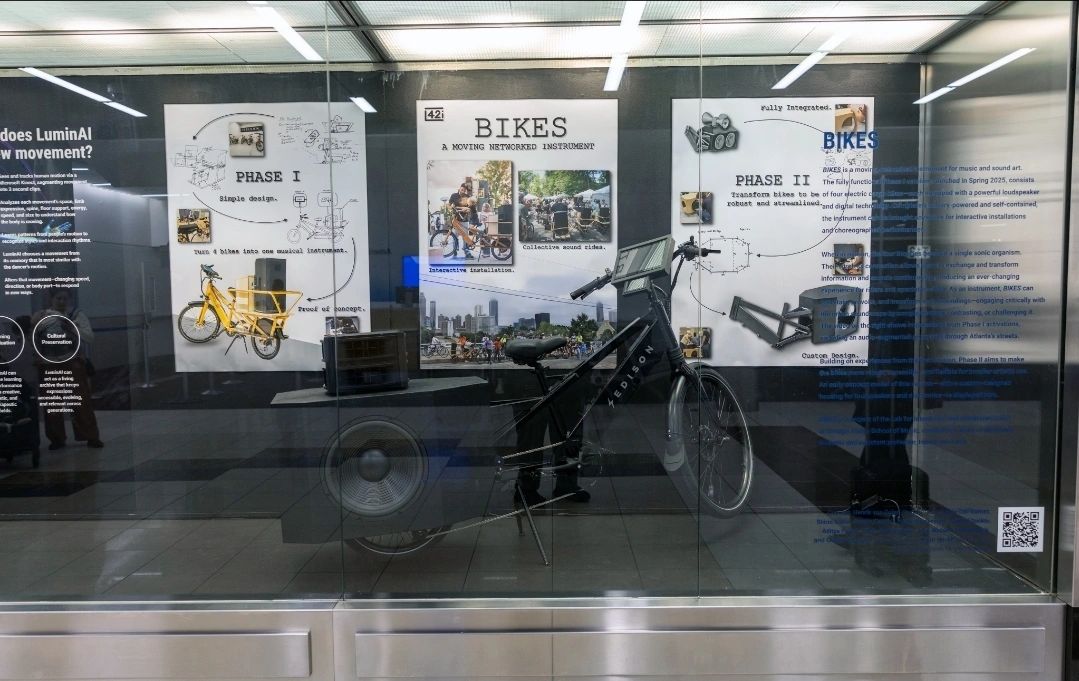
BIKES is a mobile musical instrument that transforms four electric bicycles into a networked sound system for performance and public space. Developed by Georgia Tech’s School of Music, the School of Industrial Design, and Edison Bicycles, the project uses battery-powered technology to create sustainable, multi-channel sound on the move. By combining mobility, connectivity, and electronic music, BIKES reimagines the urban soundscape and expands how audiences experience sound in everyday environments.
Gil Weinberg
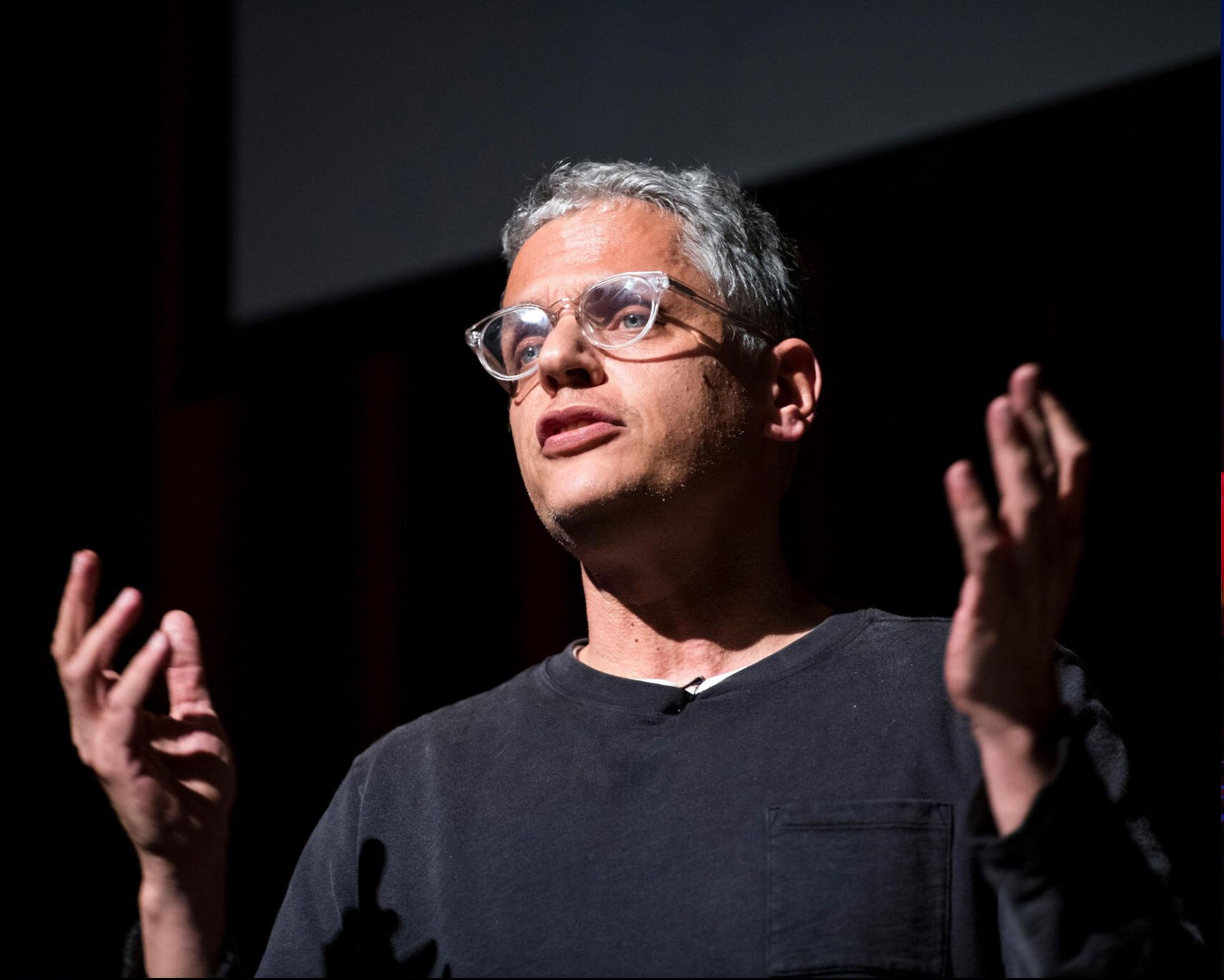
Gil Weinberg is a professor and founding director of Georgia Tech’s Center for Music Technology. Weinberg is the creator of Robotic Musicianship – Haile, a project that investigates how intelligent instruments can listen, improvise, and collaborate with human performers to expand the possibilities of musical expression. His research focuses on artificial creativity and musical expression for robots and augmented humans. His work has been featured at The Kennedy Center, Ars Electronica, and the Smithsonian Cooper Hewitt Museum, and performed with orchestras such as the Deutsches Symphonie-Orchester Berlin and the BBC Symphony. Click Here to Learn More.
Explore the School of Music Lab
Robotic Musicianship

Haile is a robotic percussionist crafted from wood and metal that listens like a human and plays with machine precision. Designed as both collaborator and performer, Haile learns from human musicians, adapting in real time. The project explores the boundaries between human and artificial creativity, using rhythm and interaction to expand musical expression and redefine what it means to create art.
Lisa Marks

Lisa Marks is an industrial designer and assistant professor at Georgia Tech whose work bridges computational design, craft, and technology. Her research explores how algorithmic methods can preserve global craft traditions while promoting sustainability and social equity. In Weaving Technology, Marks brings together parametric design and handcraft to reimagine how traditional techniques can evolve, offering new approaches to sustainability, cultural preservation, and human-centered making. Through collaborations with artisans, she uses digital tools to expand the possibilities of handmade design, redefining the relationship between human creativity and machine precision. Click Here to Learn More.
Explore the School of Industrial Design Lab
Weaving Technology
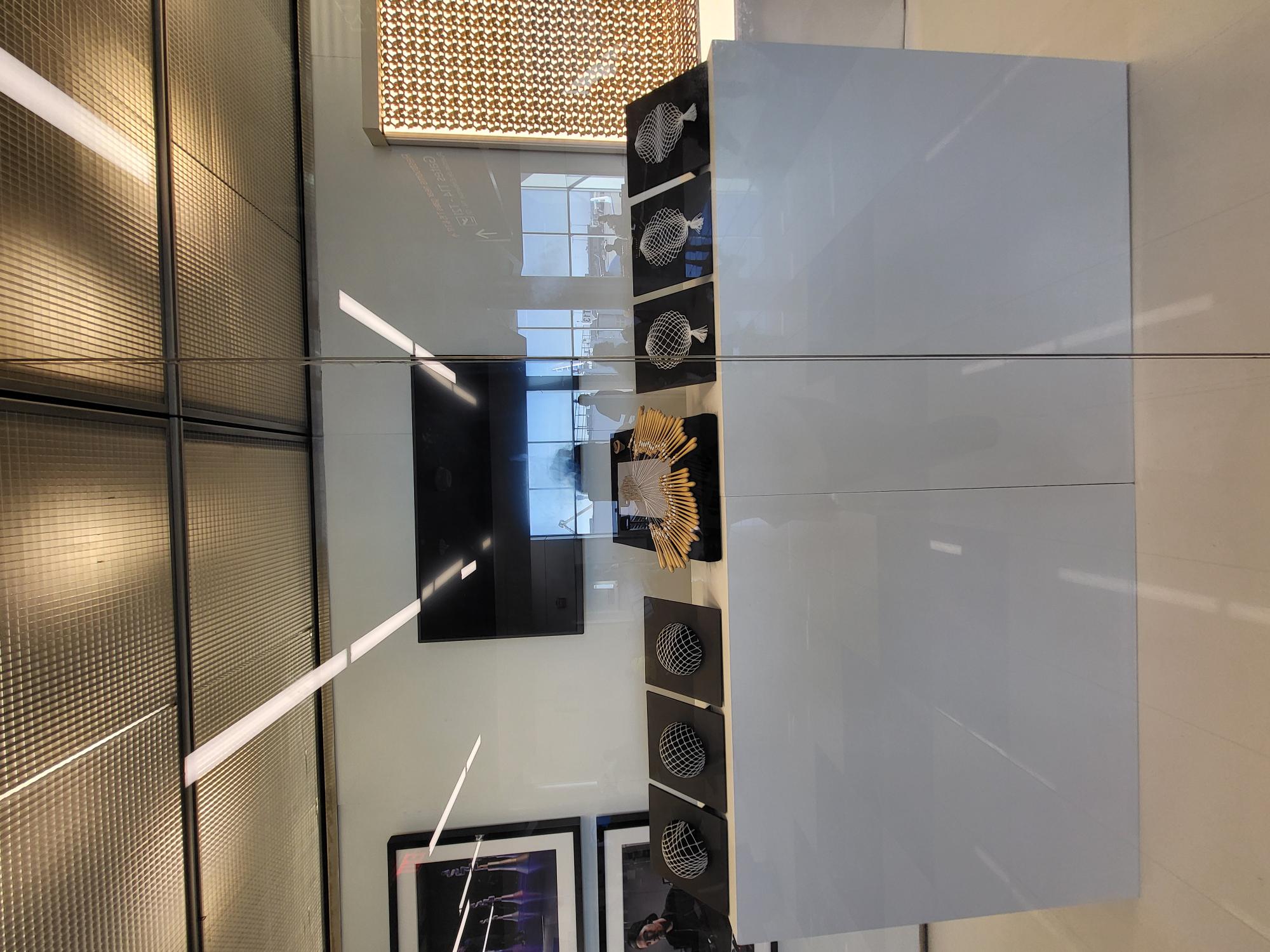
Parametric algorithms merge with traditional handcraft in Lisa Marks’ work, bridging technology, culture, and care. From Thai bamboo weaving to lace bras designed for post-mastectomy women, her practice reimagines and preserves global craft traditions. Through this fusion of code and craft, Marks explores sustainability, empowerment, and the enduring role of human touch in a digital world.
Hyojin Kwon

Hyojin Kwon is an assistant professor in Georgia Tech’s School of Architecture and founding partner of Pre- and Post-, a design practice based in Boston and Seoul. Kwon is the artist behind Plastic Reimagined: Material Agency and Circular Design and Ephemeral Instruments: Images as Architectural Media, two installations that examine how technology and material experimentation can reshape architecture and the built environment. Her work investigates how digital media reshape architectural design, culture, and urban experience. Through research, teaching, and installation, Kwon explores the evolving relationship between technology, space, and human perception across global contexts.
Explore the School of Architecture Lab
Plastic Reimagined and Ephemeral Objects
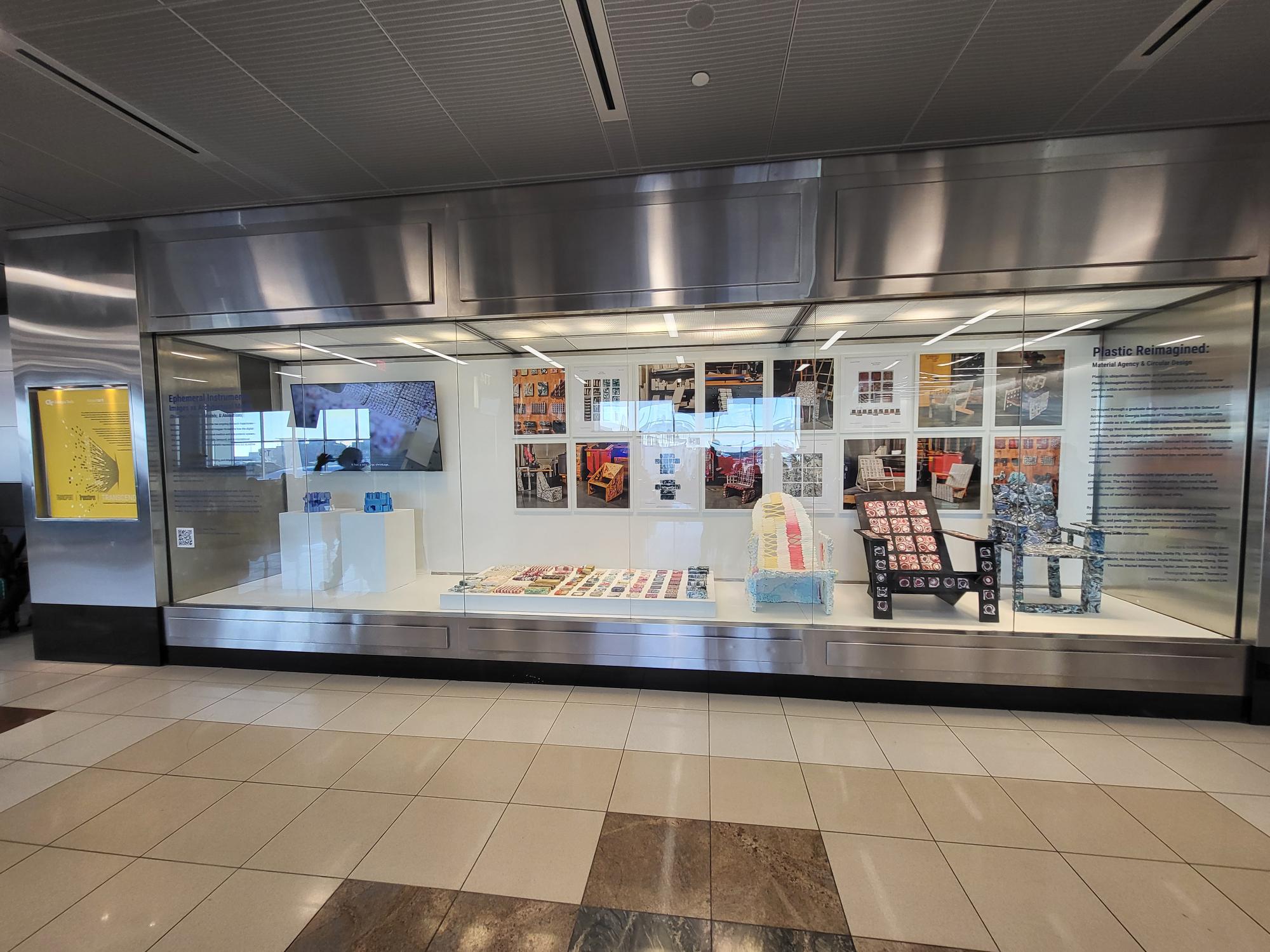
Discarded plastic becomes a medium for architectural experimentation and innovation. In this studio, students transform waste into material possibilities through computational design and hands-on fabrication. Each chair explores new life cycles for plastic, merging technology, sustainability, and craft to question how discarded matter can be reimagined within the built environment and given renewed purpose. By working directly with HDPE and PLA waste, the students test how color, structure, and form can emerge from materials often treated as disposable. The results highlight the potential of circular design to shift cultural attitudes about consumption and reveal how architectural thinking can produce new value from overlooked resources.
Ashutosh Dhekne

Ashutosh Dhekne is an associate professor in Georgia Tech’s School of Computer Science whose research centers on wireless localization, sensing, and mobile computing. Created by Ashutosh Dhekne, TechThrive uses ultra-wideband wireless sensing to translate human movement and real flight paths into shifting fields of color that highlight the relationship between individual motion and global travel. His work advances the precision and efficiency of wireless systems through novel algorithms and hardware designs. A recipient of the NSF CAREER Award in 2022, Dhekne continues to explore how ubiquitous connectivity can enable smarter, more responsive environments. He holds a Ph.D. from the University of Illinois at Urbana-Champaign. Click Here to Learn More.
Discover the School of Computer Science Lab
TechThrive
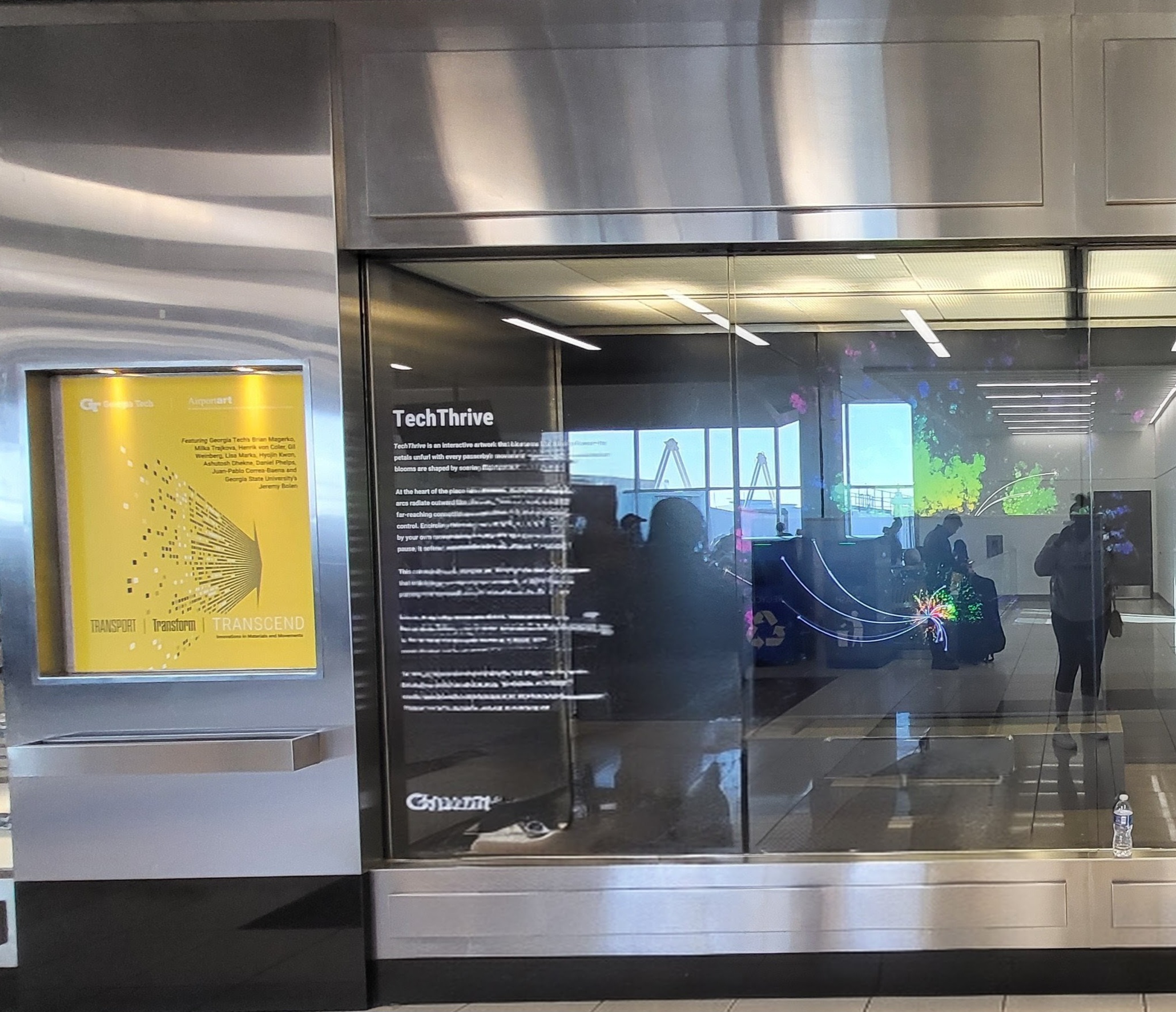
Motion meets data in this kinetic artwork that transforms human movement and flight paths into waves of color and light. Developed through Georgia Tech’s TechThrive project, the installation uses ultra-wideband signals to visualize motion without cameras, preserving privacy while revealing the unseen rhythms of people and place. By translating movement into dynamic form, it celebrates connection and the beauty of interaction in a data-driven world.
Daniel Phelps
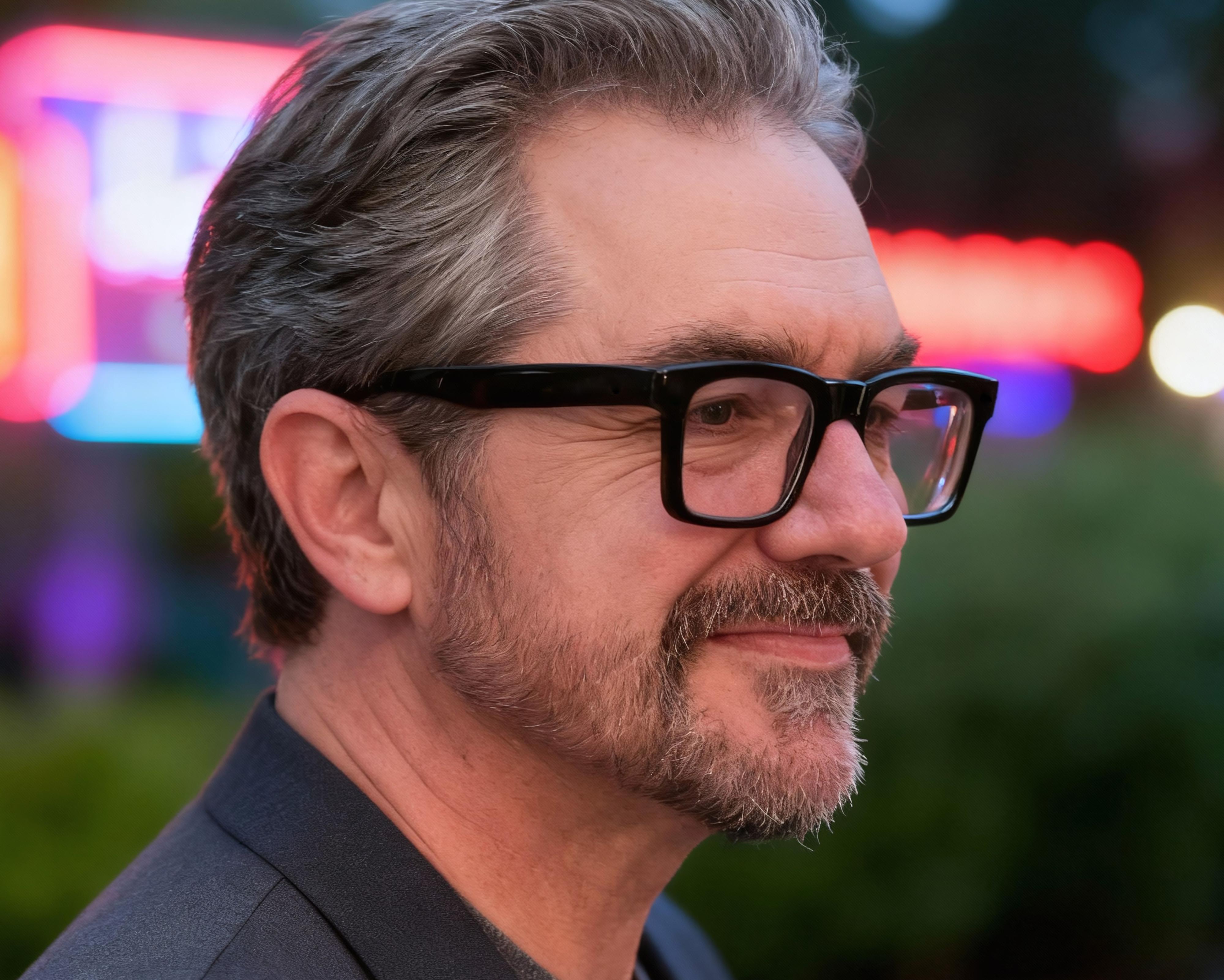
Explore the School of Literature, Media, & Communication Lab
Silicon & Soil (S&S)
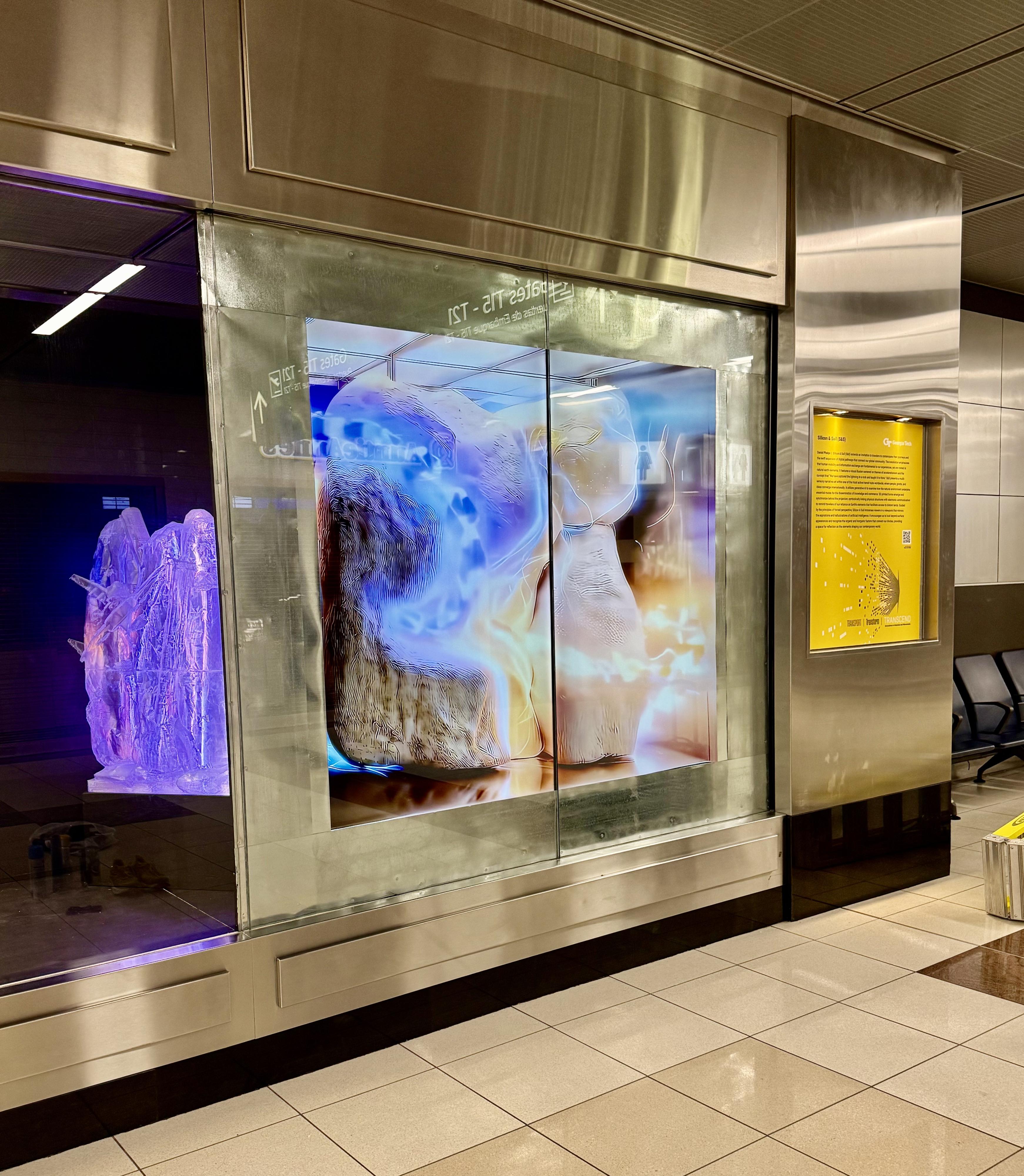
Silicon & Soil (S&S) invites travelers to contemplate their journeys and the swift expansion of digital pathways that connect our global community. The installation emphasizes that human mobility and information exchange are fundamental to our experiences, yet are rooted in natural earth elements. It features a visual illusion centered on themes of accelerationism and the concept that “We have captured the lightning in a rock and taught it to think.” S&S presents a multi-sensory narrative set within one of the most active transit hubs worldwide, where people, goods, and ideas converge internationally. It utilizes generative AI to examine how the natural environment underpins essential routes for the dissemination of knowledge and commerce. 3D printed forms emerge and synchronize behind the projection, symbolically linking physical structures with electronic communication to remind travelers of our reliance on Earth's elements that facilitate access to distant lands. Guided by the principles of forced perspective, Silicon & Soil immerses viewers in a viewpoint that mirrors the aspirations and hallucinations of artificial intelligence. It encourages us to look beyond surface appearances and recognize the organic and inorganic factors that connect our divides, providing a space for reflection on the elements shaping our contemporary world.
Juan-Pablo Correa-Baena and Jeremy Bolen

Juan-Pablo Correa-Baena is an assistant professor in Georgia Tech’s School of Materials Science and Engineering whose research advances solar energy materials and sustainable energy systems. In Glaring Through the Sun, Correa-Baena brings his research in solar energy materials into an artistic context, using scientific data to explore how emerging energy systems shape environmental futures. His work focuses on next-generation photovoltaic technologies, exploring how material design and fabrication can improve efficiency, scalability, and environmental impact. Through interdisciplinary research and global collaboration, Correa-Baena works to accelerate the transition toward clean, accessible, and renewable energy solutions.
Explore the School of Materials Science and Engineering Lab
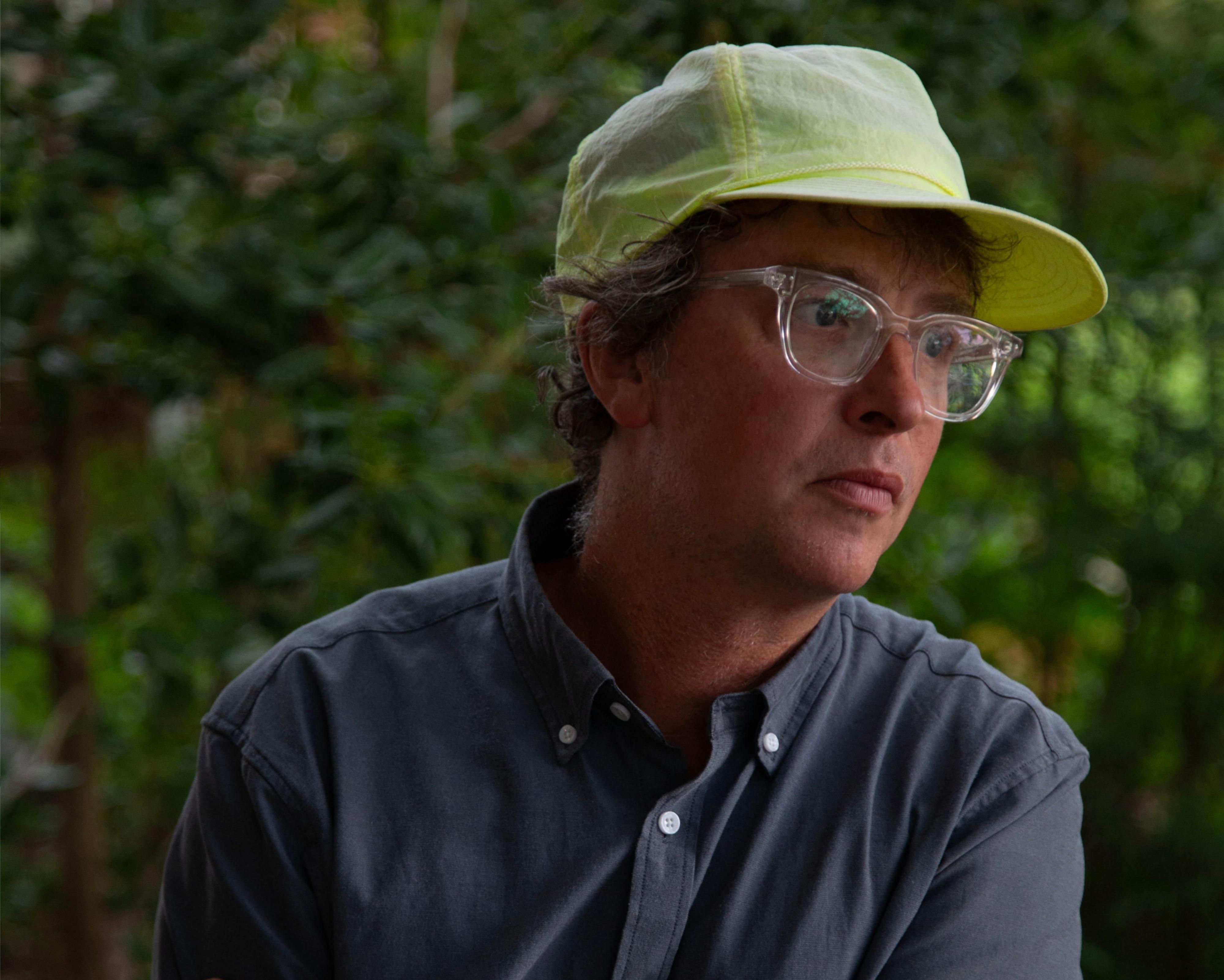
Jeremy Bolen is a multidisciplinary artist and educator at Georgia State University whose work examines environmental change and speculative futures through photography, installation, and research. Bolen’s approach to Glaring Through the Sun blends photography, installation, and speculative research to prompt reflection on the cultural and ecological implications of manipulating the planet’s energy balance. His practice investigates the unseen effects of human activity on landscapes, infrastructures, and ecologies, often engaging with scientific institutions and fieldwork as part of the creative process. Through experimental imaging and site-specific projects, Bolen explores how art can make the invisible visible, prompting reflection on perception, preservation, and the future of our shared environment.
Explore the College of the Arts Lab
Glaring Through the Sun
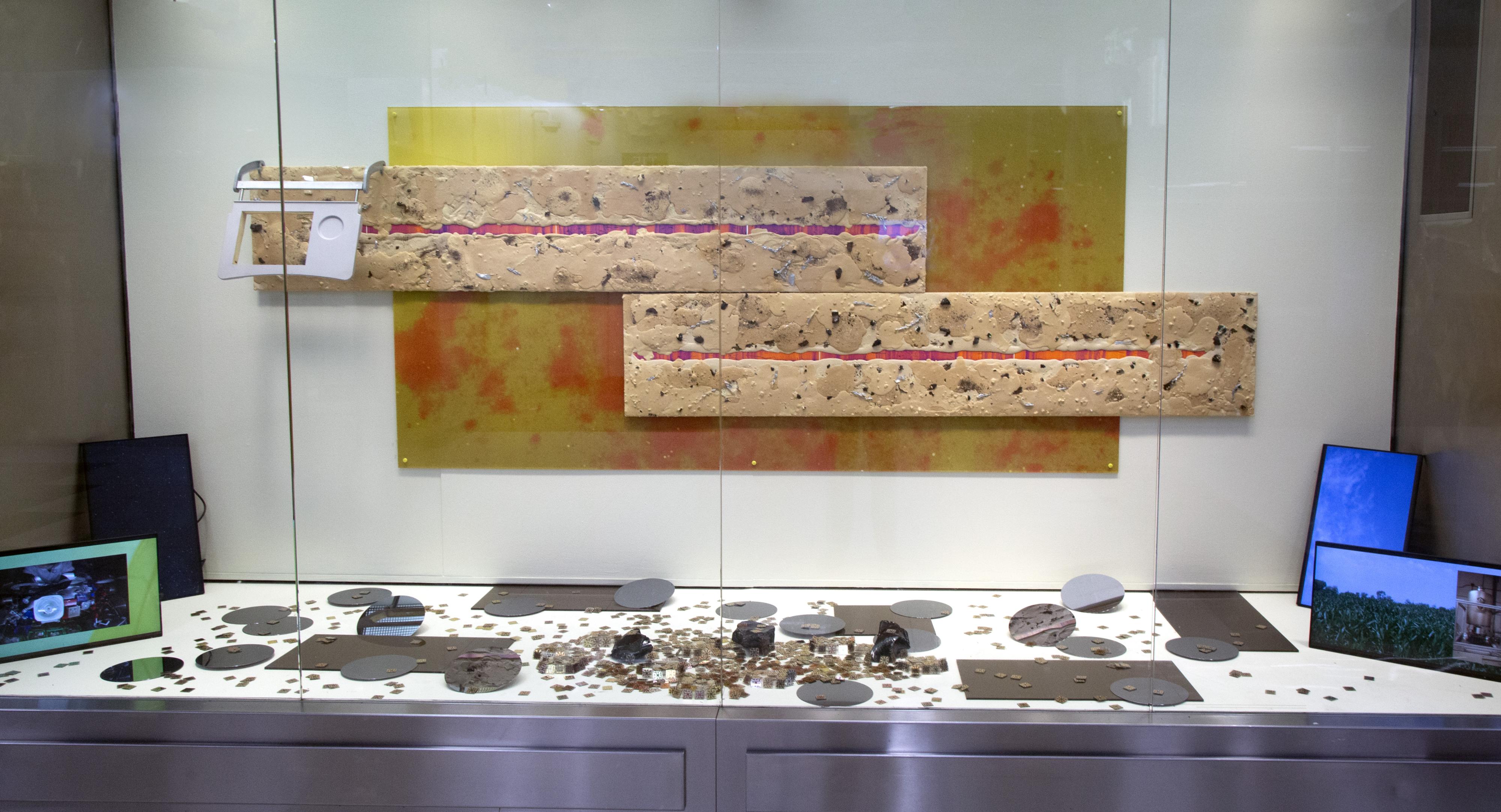
Glaring Through the Sun incorporates work and research by artist Jeremy Bolen and Scientist Dr. Juan-Pablo Correa-Baena, speculating on the possibilities and challenges of balancing the sun's energy to keep our planet continually habitable. With a focus on the opposing ideas of solar power (the conversion of energy from sunlight to electricity or heat) and solar radiation management (a proposed procedure in which sulfur particles injected into the stratosphere would combat rising temperatures by reflecting sunlight away from the Earth’s surface) this work aims to mobilize new publics around the urgent challenges of these initiatives.
